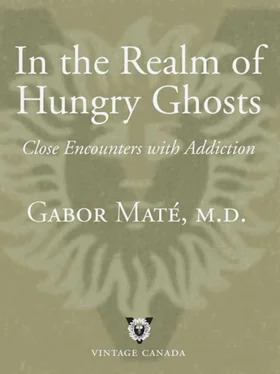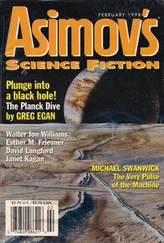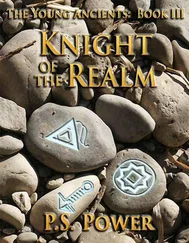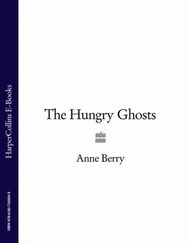
The work can be intensely satisfying or deeply frustrating, depending on my own state of mind. Often I face the refractory nature of people who value their health and well-being less than the immediate, drug-driven needs of the moment. I also have to confront my own resistance to them as people. Much as I want to accept them, at least in principle, some days I find myself full of disapproval and judgment, rejecting them and wanting them to be other than who they are. That contradiction originates with me, not with my patients. It’s my problem—except that, given the obvious power imbalance between us, it’s all too easy for me to make it their problem.
My patients’ addictions make every medical treatment encounter a challenge. Where else do you find people in such poor health and yet so averse to taking care of themselves or even to allowing others to take care of them? At times, one literally has to coax them into hospital. Take Kai, who has an immobilizing infection of his hip that could leave him crippled, or Hobo, whose breastbone osteomyelitis could penetrate into his lungs. Both men are so focused on their next hit of cocaine or heroin or “jib”—crystal meth—that self-preservation pales into insignificance. Many also have an ingrained fear of authority figures and distrust institutions, for reasons no one could begrudge them.
“The reason I do drugs is so I don’t feel the fucking feelings I feel when I don’t do drugs,” Nick, a forty-year-old heroin and crystal meth addict once told me, weeping as he spoke. “When I don’t feel the drugs in me, I get depressed.” His father drilled into his twin sons the notion that they were nothing but “pieces of shit.” Nick’s brother committed suicide as a teenager; Nick became a lifelong addict.
The Hell Realm of painful emotions frightens most of us; drug addicts fear they would be trapped there forever but for their substances. This urge to escape exacts a fearful price.
The cement hallways and the elevator at the Portland Hotel are washed clean frequently, sometimes several times a day. Punctured by needle marks, some residents have chronic draining wounds. Blood also seeps from blows and cuts inflicted by their fellow addicts or from pits patients have scratched in their skin during fits of cocaine-induced paranoia. One man picks at himself incessantly to get rid of imaginary insects.
Not that we lack real infestation in the Downtown Eastside. Rodents thrive between hotel walls and in the garbage-strewn back alleys. Vermin populate many of my patients’ beds, clothes and bodies: bedbugs, lice, scabies. Cockroaches occasionally drop out from shaken skirts and pant legs in my office and scurry for cover under my desk. “I like having one or two mice around,” one young man told me. “They eat the cockroaches and bedbugs. But I can’t stand a whole nest of them in my mattress.”
Vermin, boils, blood and death: the plagues of Egypt.
In the Downtown Eastside the angel of death slays with shocking alacrity. Marcia, a thirty-five-year-old heroin addict, had moved out of her PHS residence and was living in a tenement half a block away. One morning, I received a frantic phone call about a suspected overdose. I found Marcia in bed, her eyes wide open, lying on her back and already in rigor mortis. Her arms were extended, palms outward in a gesture of alarmed protest as if to say: “No, you’ve come to take me too soon, much too soon!” Plastic syringes cracked under my shoes as I approached her body. Marcia’s dilated pupils and some other physical cues told the story—she died not of overdose but of heroin withdrawal. I stood for a few moments by her bedside, trying to see in her body the charming, if always absent-minded, human being I had known. As I turned to leave, wailing sirens signalled the arrival of emergency vehicles outside.
Marcia had been in my office just the week before, in good cheer, asking for help with some medical forms she needed to fill out, to get back on welfare. It was the first time I’d seen her in six months. During that period, as she explained with nonchalant resignation, she had helped her boyfriend, Kyle, blow through a hundred-and-thirty-thousand-dollar inheritance—a process selflessly aided by many other user friends and hangers-on. For all that popularity, she was alone when death caught her.
Another casualty was Frank, a reclusive heroin addict who would grudgingly let you into his cramped quarters at the Regal Hotel only when he was very ill. “No fucking way I’m dying in hospital,” he declared, once it became clear that the grim reaper AIDS was knocking at his door. There was no arguing with Frank about that or anything else. He died in his own ragged bed, but his bed, in 2002.
Frank had a sweet soul that his curmudgeonly abrasiveness could not hide. Although he never talked to me about his life experience, he expressed the gist of it in “Downtown Hellbound Train,” a poem he wrote a few months before his death. It is a requiem for himself and for the dozens of women—drug users, sex trade workers—said to have been murdered at the infamous Pickton pig farm outside Vancouver.
Went downtown—Hastings and Main
Looking for relief from the pain
All I did was find
A one-way ticket on a Hellbound Train
On a farm not far away
Several friends were taken away
Rest their souls from the pain
End their ride on the Hellbound Train
Give me peace before I die
The track is laid out so well
We all live our private hell
Just more tickets on the Hellbound Train
Hellbound Train
Hellbound Train
One-way ticket on a Hellbound Train
Having worked in palliative medicine, care of the terminally ill, I have encountered death often. In a real sense, addiction medicine with this population is also palliative work. We do not expect to cure anyone, only to ameliorate the effects of drug addiction and its attendant ailments and to soften the impact of the legal and social torments our culture uses to punish the drug addict. Except for the rare fortunate ones who escape the Downtown Eastside drug colony, very few of my patients will live to old age. Most will die of some complication of their HIV or hepatitis C or of meningitis or a massive septicemia contracted through multiple self-injections during a prolonged cocaine run. Some will succumb to cancer at a relatively young age, their stressed and debilitated immune systems unable to keep malignancy in check. That’s how Stevie died, of liver cancer, the sweet-sardonic expression that always played on her face obscured by deep jaundice. Or they’ll do a bad fix one night and die of an overdose, like Angel at the Sunrise Hotel or like Trevor, one floor above, who always smiled as if nothing ever bothered him.
One darkening February evening, Leona, a patient who lives in a nearby hotel, awoke on the cot in her room to find her eighteen-year-old son, Joey, lifeless and rigid in her bed. She had taken him in from the street and was keeping watch to save him from self-harm. Mid-morning, after an all-night vigil, she fell asleep; he overdosed in the afternoon. “When I woke up,” she recalled, “Joey was lying motionless. Nobody had to tell me. The ambulance and fire guys came, but there was nothing anybody could do. My baby was dead.” Her grief is oceanic, her sense of guilt fathomless.
One constant at the Portland Clinic is pain. Medical school teaches the three signs of inflammation, in Latin: calor, rubror, dolor —heat, redness and pain. The skin, limbs or organs of my patients are often inflamed, and for that my ministrations can be at least temporarily adequate. But how to soothe souls inflamed by the intense torment imposed first by childhood experiences almost too sordid to believe and then, with mechanical repetition, by the sufferers themselves? And how to offer them comfort when their sufferings are made worse every day by social ostracism—by what the scholar and writer Elliot Leyton has described as “the bland, racist, sexist and ‘classist’ prejudices buried in Canadian society: an institutionalized contempt for the poor, for sex trade workers, for drug addicts and alcoholics, for aboriginal people.” 1The pain here in the Downtown Eastside reaches out with hands begging for drug money. It stares from eyes cold and hard or downcast with submission and shame. It speaks in cajoling tones or screams aggressively. Behind every look, every word, each violent act or disenchanted gesture is a history of anguish and degradation, a self-writ tale with new chapters added each day and scarcely a happy end.
Читать дальше













